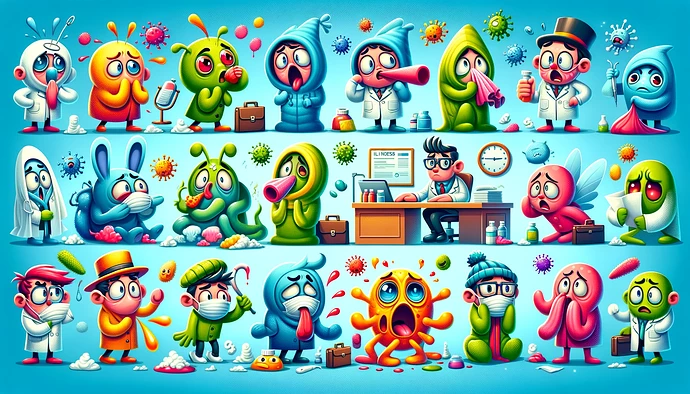Right now I am sick and to say I feel bad is an understatement… I am so mad!! haha I hate being sick and how it makes you less productive since you have to rest so you can get over it faster.
I think one of the worse parts is you have to go to the doctor to find out what is wrong with you. Plus they are the only ones who can write you the prescription to get your medicine.
But if you were to learn some of the common illnesses, you would be able to figure out with you a lot sooner and see a doctor faster if need be depending on the illness. If you get explosive diarrhea all of a sudden and it doesn’t want to stop, see a doctor when you can! Diarrhea is no joke!
For this memory challenge we are going to learn 11 common illnesses. Maybe I can add more illnesses later. You should definitely add illnesses you know you get more or are around since that would be more helpful!
Purpose of challenge: Being able to organize all the corresponding info to each illnesses and be able to filter mentally based off the symptoms you have.
Benefit of challenge: You will be able to have an idea of what illness you have and what illnesses other people may have around you so you can keep them away!
Here are 11 common illnesses:
- Common Cold
- Symptoms: Runny or stuffy nose, sore throat, cough, congestion, slight body aches, sneezing, low-grade fever.
- Treatments: Rest, increased fluid intake, pain relievers like acetaminophen or ibuprofen, throat lozenges, decongestant nasal sprays.
- Prevention: Wash hands frequently, avoid close contact with sick individuals, disinfect surfaces, and maintain a healthy immune system through diet and exercise.
- Influenza (Flu)
- Symptoms: Fever, chills, muscle aches, cough, congestion, runny nose, fatigue.
- Treatments: Antiviral drugs, rest, fluids, pain relievers like acetaminophen.
- Prevention: Get the annual flu vaccine, practice good hygiene, avoid close contact with people who are sick, and strengthen your immune system.
- Gastroenteritis (Stomach Flu)
- Symptoms: Diarrhea, abdominal cramps, nausea, vomiting, occasional muscle aches or headache, low-grade fever.
- Treatments: Staying hydrated, resting, over-the-counter antidiarrheal medications and anti-nausea medications.
- Prevention: Wash hands thoroughly, especially after using the toilet and before eating; avoid undercooked or raw food; drink clean water.
- Urinary Tract Infection (UTI)
- Symptoms: Persistent urge to urinate, burning sensation when urinating, cloudy urine, red or bright pink urine (blood in urine), pelvic pain.
- Treatments: Antibiotics, drinking plenty of fluids, pain relievers.
- Prevention: Stay hydrated, urinate frequently, wipe from front to back after toileting, and avoid potentially irritating feminine products.
- Bronchitis
- Symptoms: Persistent cough, mucus production, fatigue, shortness of breath, slight fever and chills.
- Treatments: Rest, fluids, pain relievers, cough syrup, sometimes antibiotics if bacterial.
- Prevention: Avoid smoking, limit exposure to irritants like dust and vapors, get vaccinated for influenzas and pneumonia if at risk, and practice good hand hygiene.
- Allergic Rhinitis (Hay Fever)
- Symptoms: Sneezing, runny or stuffy nose, itchy eyes, congestion, sinus pressure.
- Treatments: Antihistamines, nasal corticosteroid sprays, decongestants, avoiding allergens.
- Prevention: Avoid allergens such as pollen, dust mites, and pet dander; use air purifiers; and consider allergy shots if severe.
- Strep Throat
- Symptoms: Sore throat, pain when swallowing, red and swollen tonsils, tiny red spots on the roof of the mouth, swollen lymph nodes.
- Treatments: Antibiotics, throat lozenges, pain relievers, gargling salt water.
- Prevention: Avoid close contact with infected individuals, wash your hands frequently, and do not share eating utensils or drinking glasses.
- Food Poisoning
- Symptoms: Nausea, vomiting, watery or bloody diarrhea, abdominal pain and cramps, fever.
- Treatments: Rest, staying hydrated, over-the-counter remedies like loperamide and bismuth subsalicylate if needed.
- Prevention: Properly handle, cook, and store food; wash hands and surfaces often; separate raw and cooked foods to avoid cross-contamination.
- Tonsillitis
- Symptoms: Swollen tonsils, sore throat, difficulty swallowing, fever, tender lymph nodes on the sides of the neck.
- Treatments: Antibiotics for bacterial tonsillitis, pain relievers, throat lozenges, plenty of fluids.
- Prevention: Avoid close contact with others who are sick, maintain good oral hygiene, and frequently wash your hands.
- Asthma
- Symptoms: Shortness of breath, wheezing, coughing, chest tightness.
- Treatments: Inhaled corticosteroids, bronchodilators, avoiding triggers, using an asthma action plan.
- Prevention: Avoid asthma triggers like smoke, dust, and pet dander; get vaccinated for influenza and pneumonia; and manage stress.
- Eczema (Atopic Dermatitis)
- Symptoms: Itchy skin, redness, dry skin, small bumps on the skin, thickened skin.
- Treatments: Moisturizing creams, topical steroids, avoiding irritants, phototherapy.
- Prevention: Moisturize skin regularly, avoid harsh soaps and chemicals, manage stress, and wear non-irritating fabrics.
